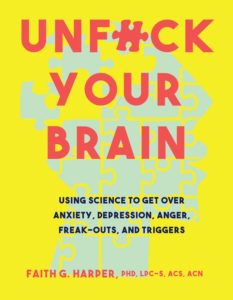Reviewed By: Morgan Lewis

Faith G. Harper provides professional and humored advice on dealing with unhealed trauma. Unf*ck Your Brain is a personable and relatable therapy session, for someone who is beginning on their journey to learn how their brain processes trauma, as well as skills to adapt to life as is. Harper sits her readers down to explain how messy the brain and healing process can be. There is no overnight cure for anxiety, depression, or triggers, but she provides ways in which her readers can retrain their brain after a traumatic event, whether it be through exercises or professional help. Harper spends the first half of her book going into detail on the science behind why our brains react the way they do to trauma. She then spends the next half reviewing ways a person can get help with any mental illness. Instead of providing surface level information on emotional and mental health, Harper goes into detail, giving her readers facts with professional and scientific evidence to support the knowledge throughout the book. When our brains “freak-out” and we feel as if we have lost control of our emotions, and our actions, this book is perfect start to learn ways to regain control.
Faith G. Harper is a licensed professional counselor, certified sexologist, certified clinical nutritionist, and certified clinical hypnotherapist. Although she has a collection of non-fiction books like Unf*ck Your Brain, that discuss ways to improve different aspects of your life according to a therapist’s perspective, Unf*ck Your Brain is the first book in the collection, published in 2017. Harper is a master at using her extensive education as well as transparency to write her books. Reading her book feels as if you are talking to a trusted friend about mental health, instead of a typical counselor or doctor. Unlike normal self-help books, Unf*ck Your Brain is honest, humorous, and easy for readers to digest. Harper uses her real experience with clients to write about effective ways someone can deal with brain triggers. She presents evidence that her methods work, and easily gains trust within the reader with her advice as well as encouragement. This book is not used to self-diagnose. Instead, it is used to inform, and be a guide for people looking to improve their mental stability or help someone else with theirs. Throughout the book, Harper lists more ways beyond the book to receive professional help.
The chapters in the book are chronologically ordered in a way that makes understanding the information easier. Starting with the brain, and how it processes trauma throughout our body, and ending with the detailed explanations of different mental illnesses. The first lesson on how to retrain your mind is described in three steps. These three steps are stabilization, remembrance, and reconnection. This is a pivotal section in the book because it is the base in which she builds on. She goes into detail on each step, and further builds on them with the following chapters. The exercises she gives readers surrounds how to achieve success in each step and keep the brain in a non-triggering state. Going further, Harper suggests lifestyle changes that could keep emotions and mental state in a more peaceful place, like a change of diet and exercise. Harper’s advice can apply to many subdivisions of life and shows a diversity in information as each chapter continues. Towards the ending of the book, Harper reassures readers that the healing process takes time, but if they practice positive exercises, the relationship with their trauma will change, and instead of their trauma controlling their every move, a person can be in control of their mind instead.
Unf*ck Your Brain changes the way mental health can be discussed amongst people. It gives a down to earth truth about what it takes to achieve mental stability that makes people gravitate towards working on themselves. The bigger goal is to make readers more inclined to receive help with their mental health in ways everyone can understand. Harper’s voice is comforting and comical, but also experienced and knowledgeable. Harper’s choice of communication style can open doors for a new audience of readers to become educated on the science of our brain, as well as mental health. Her book outlines foundational knowledge about why we feel the emotions we do, and ways to improve them. For some, this information is only partially new, but for others, this information can be used to begin the healing treatment needed for their journey. Regardless of whether a person is well informed on how to deal with brain triggers, or seeking help for the first time, this book can be read to give encouragement and knowledge on how to regain control over your emotions. Self-help books can have a dull and stuffy disposition, but Unf*ck Your Brain goes out of its way to provide important information in a humorous manner.
